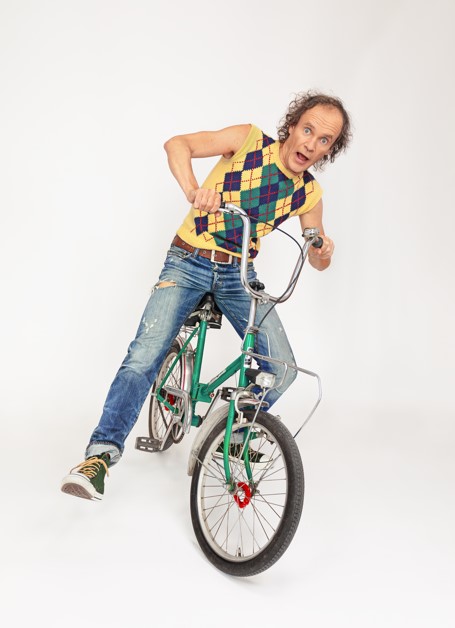The Saxon-accented comedian Olaf Schubert makes his audience laugh with incorrectly used proverbs and foreign words as well as sudden leaps of thought in often bizarre stories. With thinning hair, a slightly shaky voice and the same checked sweater vest over his head, he is also remembered for his unusual look. It's no wonder that tickets for his shows sell out quickly - Olaf Schubert is one of the most popular comedians in Germany!
Germany's most famous sweater wearer was born on November 7, 1967 under the name Michael Haubold in Plauen, Vogtland. However, the interested comedy fan only learns ironic details about his life: According to his own website, Olaf Schubert worked as a "pedicurist, cameraman and food carrier" before starting to study architecture in Berlin and Minsk.
Humorous beginnings as a musician
According to his satirical biography, Olaf Schubert began the process of bringing about change in the GDR in the early autumn of 1989 together with other civil rights activists. His first demo tape from 1991, entitled "Inventory - Songs about the state of affairs after the change," deals humorously with the fall of the Berlin Wall. Olaf Schubert was 24 years old at the time and was still primarily a musician. Ironic lyrics, however, were already an integral part of his art.
In the 1990s, the focus of his work was on making music with band members Jochen Barkas and Bert Stephan. Olaf Schubert played with them in various bands - always under a pseudonym: as drummer Gabi Schubert in the ironic combo "Dekadance" and, until 2013, as drummer Michael Rock in the cover band "Die Rockys". The trio can also be seen regularly on stage as "Olaf Schubert and his friends".
The leap into the TV and comedy world
The comedian developed the fictional character Olaf Schubert in his characteristic pullover with a diamond pattern in 1995. The first program without music was created with the title "Here I am", followed by the second cabaret piece "Feeling Wins" in 1996. In the same year, Schubert developed his first classic: the humorous "Nativity Play" has been brought to the stage every year since its premiere in constantly updated versions.
The comedian from Saxony first became known to a wider audience through small guest appearances on television shows. Formats such as “Quatsch Comedy Club”, “Um Antwort wird bitte”, “Comedyshow”, “NightWash”, “Cindy aus Marzahn und die jungen Wilden”, “TV Total” and the “Heute Show” increased Olaf Schubert’s fame and popularity.
Away from the world of TV, Olaf Schubert continues to perform shows on regional stages, initially together with his band members. It was not until 2008 that the artist also developed solo programs and, together with the now deceased cabaret artist Olaf Böhme, developed the stage show "Olaf meets Olaf". With "Meine Kämpfe" Olaf Schubert finally made his breakthrough - he was awarded the German Comedy Prize as "Best Newcomer".
In 2010, Olaf Schubert got his first comedy show on German television: “Olaf TV – From Schubert to Mensch”, broadcast on 3sat. Other TV formats, stage shows and studio albums followed, including:
- 2010: “How I would save the world”
- 2013: “So!”
- 2014: “Olaf is making the world a better place!”
- 2016: “Sexy Forever”
- 2020: “Time for rebels”
- 2017: “Olaf gives courage”
Little is known about the comedian's private life. In 1993 he married his wife Carola, who is often the central topic of Olaf Schubert's tour performances - however, what he says about the relationship on stage is fictitious. The family, which has had a child since 2012, lives together in Dresden. Olaf's sister Gabi, who never comes to visit, is mentioned again and again at the artist's performances, but she is a pure invention of the artist.
